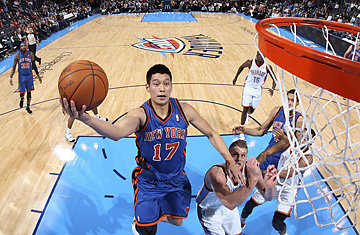
Jeremy Lin #17 of the New York Knicks shoots over Cole Aldrich #45 of the Oklahoma City Thunder on January 14, 2012 at the Chesapeake Energy Arena in Oklahoma City, Oklahoma.
(2 of 2)
In Taiwan, Lin is already a hero. The country's President, Ma Ying-jeou, has implored his new Cabinet to act Lin-like — in other words, to work as a team. Lin has become known throughout the country as "the little guy from Harvard," even though at 191 cm, he's taller than most Taiwanese. It's a term of endearment.
As a high school prospect, Lin never got such love from college coaches, who couldn't imagine the pencil-necked point guard expanding his razor-thin frame. He was raised in Palo Alto, Calif., where his father Gie-Ming Lin, a computer engineer, studied film of Larry Bird, Kareem Abdul-Jabbar and other NBA stars and tutored young Jeremy at the local YMCA — after his son finished his homework. "I cannot explain the reasons why I love basketball," Gie-Ming told me a couple of years ago. Around Palo Alto, Gie-Ming was the rare Asian-American parent who encouraged Lin to pursue the sport. "Many Asian families focus so much on academics," Gie-Ming said. "But it felt so good to play with my kids." (Lin's younger brother Joseph is on the basketball team at Hamilton College in Clinton, N.Y.) While Lin's parents promoted his hoops obsession, they had limits. Lin's mother Shirley has said that when Lin was in high school, he had to cut back on Sunday-night gym time to get a jump on that week's homework.
Lin led his high school team to a state championship, but even Bill Holden, the former Harvard assistant who recruited him, first thought Lin was destined for small-college Division III. Then Holden saw Lin go up against better competition. "The bigger the stage, the more he brings it," says Holden. In college, Lin faced additional challenges, including frequent racial taunts — real original stuff, like a fan yelling, "Sweet-and-sour pork!" When Lin entered the gym for one summer-league game, someone redirected him: no one was playing volleyball that night. Opposing Ivy League gyms housed the worst offenders. One rival player even called Lin a C word that rhymes with ink.
Despite a strong senior year, in which he rang up 30 points against perennial NCAA championship contender the University of Connecticut, no NBA team picked Lin in the draft. "Truth be told, we were devastated," says Lin's agent, Roger Montgomery. Did Lin's ethnicity work against him? "Absolutely," says Montgomery. An impressive showing in an NBA summer league earned Lin a contract with his hometown team, the Golden State Warriors, where he rode the bench and shuttled to the minors on three occasions. Skeptics wondered if the Warriors had signed Lin as a marketing draw, to appeal to Bay Area Asian Americans. "Oh, my, he was frustrated," says Lin's high school coach, Peter Diepenbrock.
The ascent of Lin reaches beyond ethnicity to religion. He is a devout Evangelical Christian, drawing inevitable comparisons to the NFL's Tim Tebow. While we haven't witnessed any prayerful "Linning" after a layup, Lin has considered the pastorate as a post-NBA calling. "There's a sense in New York that Jeremy is the savior of the Knicks," says Stephen Chen, a Lin mentor and a pastor of the Mountain View, Calif., church the Lin family attends. "He doesn't want people to think of him that way. He wants them to be able to know his Saviour, Jesus Christ."
Lin's success has also unveiled Asian Americans — a heavily urbanized ethnic group — as passionate hoopheads. Every year players from cities across the U.S. gather for Chinese-American, Korean-American and pan-Asian-American national tournaments. Many Asian Americans enjoy playing together because they feel they have to prove that the city game is theirs too. "We have a chip on our shoulder," says David Liu. When other teams start trying fancy behind-the-back passes and going for every steal, Asian Americans can tell the competition isn't taking them seriously. "It's mentally draining," says Noh-Joon Choo, 31, who plays in Chicago. They hope Lin can correct such ethnic slights.
Many Asian-American players are children of immigrants who were not exposed to U.S. sports back home. They tell recurring tales of friends with true basketball talent who suddenly gave up the game. Their parents wanted no distractions from academics. The players are convinced we'll see more Jeremy Lins as more parents, inspired by his success, allow their kids to play sports.
But hitting the books can set you up for life; the NBA is a long shot — for anyone. "There's nothing wrong with being engineers, doctors or lawyers," says Bernard Chang, a prominent Chinese-American comic-book artist in Los Angeles who played ball in college at the Pratt Institute. "I just think we should be represented in balance. Sports like basketball are a huge part of our culture. Success will help us stake our claim as Americans." Maybe the Linsanity has just begun.
— With reporting by Natalie Tso / Taipei and Vanessa Ko and Courtney Subramanian / Hong Kong
